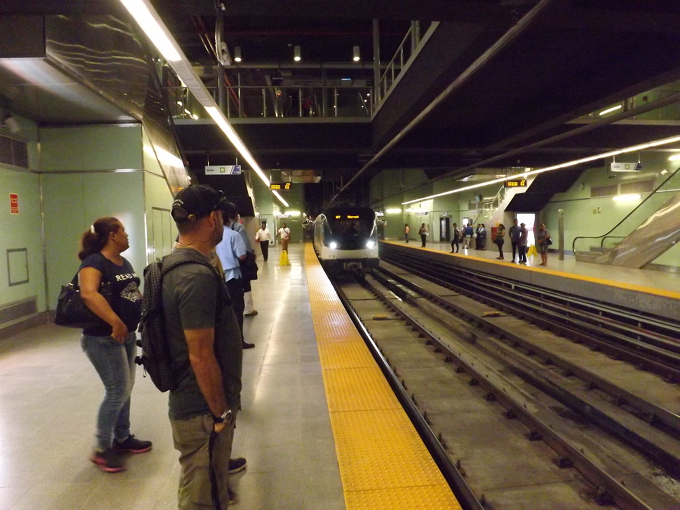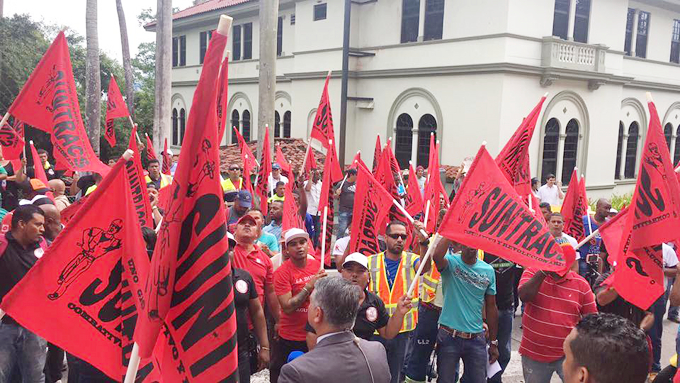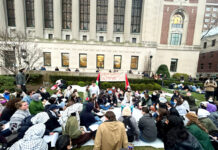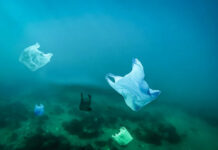
DIJ: Varela took $10.7 million from Odebrecht through 2014
Courts and prosecutors stall,
public indignation grows
by Eric Jackson
When Ramón Fonseca of Mossack Fonseca notoriety, at the beginning of the current administration the president’s minister without portfolio and day-to-day operational head of the Panameñista Party, said that Juan Carlos Varela had taken money from Odebrecht, the president flatly denied it.
When two more witnesses, an “outside” attorney hired by Odebrecth to set up its international money laundering operations to concel bribes and a former Panamanian diplomat and Panameñista bundler also said that Varela took money from Odebrecht, the president modified his position and said that when he was running for president in the run-up to the 2009 elections, before he joined a slate with Ricardo Martinelli that was brokered at the US ambassador’s residence, a person connected to Odebrecht donated $700,000 to his presidential campaign and the money was transferred to his vice presidential campaign and duly reported. Varela said that he had no idea that the money came from the rogue Brazilian corporation.
Now La Estrella’s Adelita Coriat and Marlene Testa report the police, via the Directorate of Judicial Investigations (DIJ) say that Varela took $10.7 million from Odebrecht through 2014. The ex-diplomat and bundler, Jaime Lasso, amended his declarations to confirm the timeline, but said that he did not know the amount.
As this story was unfolding, President Varela said that “Political donations are no crime, bribes are.” Then he, the vice president and several other ministers and a delegation of business leaders got on a plane to China and have been unavailable for comment in the ensuing public uproar. Lasso and his daughter Michelle have been questioned about potential money laundering offenses, and anti-corruption prosecutor Zuleika Moore says that the Public Ministry has jurisdiction over their case, but not over the president. However, Attorney General Kenia Porcell said that Jaime Lasso cannot be investigated because former prosecutor Ana Belfon already investigated him and charges were not brought in time. Belfon flatly denies that she ever investigated Lasso.
In a November 9 hearing conducted before Judge Óscar Carrasquilla, with Brazilian witness Andre Rabello testifying remotely through an online connection to São Paulo, names were named and sums were specified. The hearing was about combining the cases of various witnesses who have struck plea bargains in the Odebrecht case, and whether the court will accept those deals. It had been billed as the occasion when Panamanians would find out just who was on the take. Outside the courthouse there was a loud and colorful crowd from the militant SUNTRACS construction workers’ union — this, after all, is about their boss bribing the government — but inside the audience was limited to some of the press and almost none of the public. As it turned out, all names were not disclosed. In an interview with TVN news, former prosecutor Rosenda Miranda defended the non-disclosure, warning that since the company has agreed to cooperate with investigation, it should not be “Satanized” and that people should not presume that every transaction with the company is somehow illicit.
In previous hearings of remote witnesses who have accepted plea bargains, Judge Carrasquilla heard from Luiz Eduardo Da Rocha, who was the treasurer of Odbrecht’s “Structured Operations Department” bribery and money laundering unit, and Olivo Rodrigues Junior, also of that unit. Corroborating testimony and documents from a former executive at the Banca Privada de Andorra were the stuff of headlines in Spain and also have made their way into the hearings here. Implicated so far are former Minister of the Presidency Demetrio “Jimmy” Papadimitriu (also a US citizen and prominent Republican political operative), former Minister of Economy and Finance Frank De Lima, former Minister of Public Works Jaime Ford, the former president’s two sons Ricardo Martinelli Linares and Luis Enrique Martinelli Linares, former Housing Minister and Cambio Democratico presidential candidate José Domingo Arias, former Ministry of Public Works special projects chief Carlos Ho, Panameñista legislator and attorney Jorge Alberto Rosas and his law firm, and former head of the state-owned Caja de Ahorros bank and CEO of Martinelli’s NexTV channel Riccardo Francolini. Named as conduits in the movements of money in these transactions, in addition to the two Lassos, were private individuals Jorge Espino, José Saiz, Olmedo Méndez Tribaldos, Diamantis Papadimitriu and María Bagatelas, the Credicorp and Multicredit banks and individual bankers Humberto De León and Eduardo Patraos.
That’s well short of the full disclosure that the attorney general had indicated, especially in light of the DIJ findings that Varela took more than 10 times the amount he admitted and reported. But Kenia Porcell also indicates that there are revelations yet to come.
There was supposed to be a November 16 public hearing on another of the plea bargains, but Judge Carrasquilla has put this off on a defense motion. Lawyers for an undisclosed criminal who would testify in order to justify a plea bargain argued that this person’s safety would be endangered if she, he or the persons named in the expected testimony were identified.
The huge gaps in the official story, which the reported DIJ findings might begin to close, are about the relationships of Odebrecht with the current administration, which has arranged for the company to “win” no-bid or rigged-bid contracts the Metro train system’s extension, work on the Cinta Costera, a Colon renovation project that has been largely underwater in recent days as the low-lying city center is built on a landfilled mangrove swamp, and a number of Panama City municipal projects that include work along and near Via Argentina.
The Lasso inquiries, which the attorney general seeks to cut short with her allegations of a prior investigation, are but the slightest steps toward a probe into the activities of Panameñistas during the 26 months when they were junior partners in the Martinelli administration. For example, one of Panama’s richest oligarchs and a prominent Panameñista, Alberto Vallarino, was Minister of Economy and Finance in that period. He may be entirely innocent or may have known nothing — or may have known a lot and discretely shared those data with authorities under some sort of non-disclosure agreement — but given the timelines and activities described plus the position he held there would be a public interest in knowing what he knew, when he knew it and whether and how he acted upon any knowledge of Odebrecht’s activities.
Statutes of limitations might be invoked, but the probe has also not much delved into the early years of Odebrecht’s government contracts in Panama, during the 2004 to 2009 Torrijos administration. The corrupt nature of that corporation, whose bribery and bid rigging had brought down a Brazilian government in the early 1990s, was not a secret here.
Some of the other unknown to the public factors in the Odebrecht affair include the extent that former Martinelli administration officials signaled as taking bribes were mere conduits to the 2014 Cambio Democratico campaign and didn’t actually keep the money themselves, and to what extent Odebrecht helped to finance Ricardo Martinelli’s purchase of a media empire. Answers to the former question are in part hard to come by because the Electoral Prosecutor, Martinelli appointee Eduardo Peñaloza, is a sneering crook who has rather openly thwarted investigations into Martinelli’s crimes under the election laws. On the second score it’s unclear whether there is any criminal investigation underway. The cases against Riccardo Francolini and Ricardo Martinelli’s sons apparently touch upon money movements for the purchase of newspapers, a television station and radio stations. Earlier this year there were depositions taken about some of these matters, but for months the case, if there is one ongoing, has dropped out of the news.
Meanwhile, attention is being paid to Odebrecht’s largess in the private sector. Wherever it has corrupted governments, the company has tried to buy support from non-governmental people and institutions that might otherwise raise a hue and cry about corruption. Religious and civic leaders, the press (via ad buys and otherwise), labor unions, artists and intellectuals have typically been paid off by Odebrecht. These payments have almost always been perfectly legal, without any specific agreement about silence. Look at some of the outstanding public art on the Cinta Costera. Go on YouTube and see the Rómulo Castro video that Odebrecht financed. And then there is the money the company gave to the Catholic Church in Panama — something not quantified to date, but admitted by Panama metro area Archbishop José Domingo Ulloa. “We can’t deny it. The church, like other foundations, museums and other groups, received donations at a certain moment,” he told journalist Hugo Famanía. The monsignor drew a distinction between politicians and churches taking money, and between religious leaders accepting donations on behalf of their churches and those who would personally take the money.
From the Brazilian witnesses, there have been references to gifts to “churches,” plural. We know that the Templo Hosanna, a large Evangelical mega-church, was involved in financial transactions and political alliances with Ricardo Martinelli, and notice the absence of any finger-pointing about the Odebrecht contributions to the Catholics. Also notice the scant role of any of the churches in the months of anti-corruption protests. It’s an issue as old as Martin Luther’s protest against indulgences — or for that matter the assault on temple moneylenders that led to Jesus Christ’s arrest and crucifixion — but in the intervening years Protestants have managed to catch up with Catholics both in corruption and in reform movements.
By and large, in any room full of Panamanian politicians of any party, one might hear a pin drop if the subject of Odebrecht comes up. It’s a key political fact. The legislature is not going to impeach Varela or anyone else over this scandal because all of the parties are deeply compromised. But the more prominent independent presidential hopefuls are a different story. Law professor Miguel Antonio Bernal has been leading anti-corruption protests all along, independent legislator Ana Matilde Gómez has begun to make tepid references to the matter and possible idependent candidate Rubén Blades has weighed in.
“Nothing has been made known about whether there were bribes from Odebrecht related to works such as La Cinta Costera 1, 2 and 3, the Metro and those that are still being built by the deceitful company in our country,” Blades wrote on his website. “All the investigation has been concentrated on some of the millions that it paid to the previous government. Are not the works done by the company in the other governments going to be investigated?”
(Blades, of course, was the tourism minister and likely would have been at cabinet meetings where Odebrecht contracts were discussed during the Torrijos years. While he was minister he and this reporter had occasion to discuss and disagree about the Cinta Costera project but it was not about Odebrecht corruption so much as about urban planning principles. This reporter had written about Odebrecht’s history of corruption when they first started getting government work here, and was called in to be upbraided by a Mr. Bárcenas on Odebrecht’s behalf. In that session with Bárcenas then television personality and future Education Minister Lucy Molinar was present.)
While the militants picket outside the courthouse and the academic and professional “good government” types stage more sedate protests, polls indicate that most Panamanians believe the worst about Odebrecht’s corruption of the government. Absent some particularly inflammatory event, this is not leading up to revolution in the streets. It does, however, portend a great electoral massacre in 2019.

~ ~ ~
These announcements are interactive. Click on them for more information.










